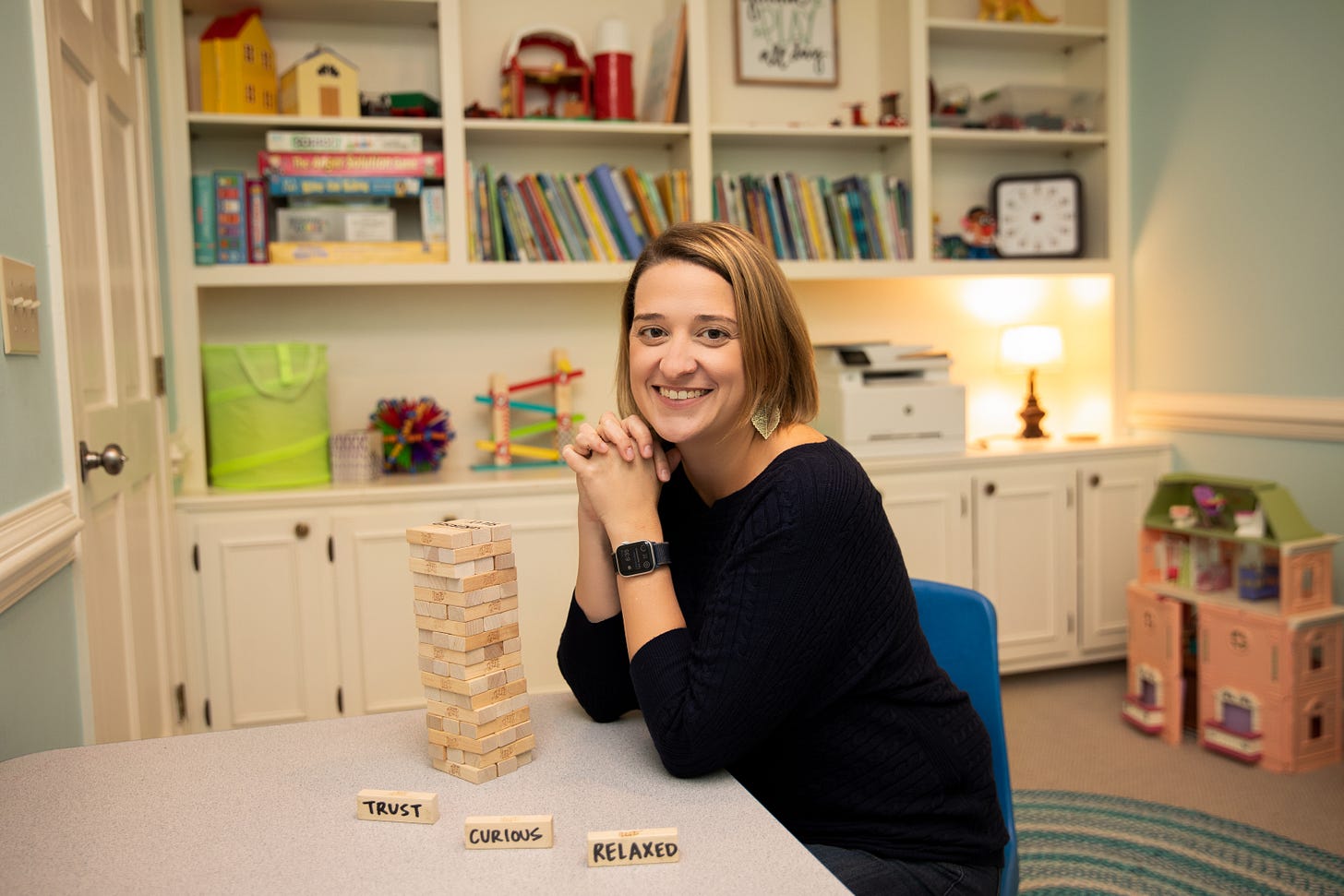
It’s the most wonderful time of the year!…for those of us who love the smell of an office supply store (if you know, you know).
To me, back-to-school is the beginning of a new year. As someone who was in school from age 4 through 26, I’m kinda set in my ways with the year being over in May and starting again in August. But August can be a mix of emotions for many. Some want to squeeze out the last drops of summer and some (often many) are out of money and out of ideas, so we all start yearning for that school-week routine around this time.
However, back-to-school can be a stressful time for many parents, especially those raising neurodivergent children and teens. You are readying yourself for another handoff of your precious child to teachers you hope “get them” this school year. Many of you are veterans at this point prepping your kids for the school year, creating routine, and helping new teachers best understand how your child regulates themselves so they can learn.
However, each fall season brings new school schedules balanced with new activities and possibly new work schedules for parents. We all know that keeping the family routine smooth is helpful for everyone’s mental wellness. I often recommend a twice-a-year family reboot for families: One after the holidays and another for back-to-school season. We learn a lot by figuring out what works and what doesn’t work for us. Here are my tips for getting started. Share your tips in the comments!
Step 1: The Parent Meeting
Get together with your parenting partner and discuss what worked and what did not work last school year. Not just for the family, but for YOU. When your needs are not met, it's hard to have energy reserves left over for parenting. If you are single parenting, talk this through with a trusted friend or therapist for some objective feedback on where you could use help or make some positive changes.
Think of this like a business plan, but it's your family plan. Families are systems and all systems work best when members are using their skills to do what they do best and asking for what they need when they need it. If we don't have these conversations, one parent might end up doing all of the logistical work in the family, which can create tension and resentment. So, list out all the details of who does what and talk openly about what is working, what is having you feeling overwhelmed, and discuss how this can be changed. Here are a few questions to get you started:
Who is doing carpool?
Who is grocery shopping?
Who is cooking?
Who is doing the laundry?
Who is working late and which night does the at-home parent need extra help?
Who is scheduling appointments for kids?
Who is taking children to therapies, music lessons, and sports practice?
How is this system communicated? Texts? A shared calendar?
Remember: Strive to create a system where parents can come in and out of the plan (when one of you goes out with friends or the other is on a business trip) and the child's routine is not significantly disrupted.
Goals for the Kids: Talk about what you are proud of about your children and what you hope they will accomplish this year. We all have different perspectives. It’s helpful to talk with your parenting partner about your expectations for your children and to get on the same page regarding needed supports and therapies, or if it's time to step back and let your child be more independent. Perhaps one of your children is ready to participate more in the family system of logistics and you can add some helpful jobs to their to-do list.
Goals for the Family: First, create a list of family values. What is important to your family? Then, what are your goals for this school year and how do they connect to those values? Do you want to connect more this year? Do you want to go on a trip to share an experience with your children? Do you want to spend more one-on-one time with each child or be more present in the evenings and weekends to connect? These moments of connection are the ones our children will remember.
Step 2: The Family Meeting
Many children are able to begin participating in a family meeting in early elementary school, but this varies widely. Does your child have the attention span to listen and talk through these things? Are they interested in sharing their opinion and problem-solving plans? If your child is reading, using a white board to list out goals can be helpful to keep everyone focused. If you don't think your child is ready to be involved in a family meeting, skip this step and include them in a year or two.
When your child is ready, schedule a time the week before school starts to talk through what everyone is proud of about last school year. Take turns talking about what you are proud of for yourself and what you are proud of in each member of the family. It’s incredibly powerful to hear parents feel proud of themselves and for siblings to be given an opportunity to express pride in each other.
Parents can then lead a goals discussion based on their ideas from the parent meeting. Did children (and parents) not get enough sleep last year and you really want to focus on better sleep hygiene this year? Do the children need to work on being more helpful during transitions at home? Was cooking healthy foods or following an exercise routine difficult last year and you want to make some routine changes so you can make this happen? How were the morning and bedtime routines? Answers to these questions lead to plans for problem-solving in step 3.
Step 3: Establish New Family Routines
Any problem area or identified weakness you have identified in Step 2 (or Step 1 if you skip the family meeting for young children) can now become a goal for improvement this school year. Your kids may have personal goals, you may have goals for yourself, and you may have family goals. Children may have specific goals like learning to ride a bike or learning to tie shoes. But when are they going to work on these? Building structured time to achieve these goals into a weekend routine is the key.
Also, will your child be able to reach these goals on their own, or will they need support? Talk through supports like timers, visual schedules, and checklists that can help your child be independently successful with routines. Consult your child’s therapy team if you are wondering if your goals for your child are developmentally appropriate or if you need ideas on the best ways to support them.
There is often a mindset shift that happens with each new school year. The growth that can happen in just one summer for children is astounding. Children are always developing new skills, even if some skills emerge at a slower pace than others. Be sure to share all of your child’s current skills and needs for support with their teacher while also supporting them with consistency and predictability at home to keep stress low. As parents, we are here to guide and support our children as they figure out who they are becoming and what they are capable of in this world.
Happy School Year and Let’s Stay Connected!
~Dr. Emily
I’m Dr. Emily, child psychologist and former school psychologist, and I’m on a mission to help parents and teachers be the best adults we can be for the neurodivergent kids and teens in our lives. This isn’t about changing the kids, it’s about changing us. Learn more with my resources for parents, teachers, and schools at www.learnwithdremily.com.
**All content provided is protected under applicable copyright, patent, trademark, and other proprietary rights. All content is provided for informational and education purposes only. No content is intended to be a substitute for professional medical or psychological diagnosis, advice or treatment. Information provided does not create an agreement for service between Dr. Emily W. King and the recipient. Consult your physician regarding the applicability of any opinions or recommendations with respect to you or your child's symptoms or medical condition. Children or adults who show signs of dangerous behavior toward themselves and/or others, should be placed immediately under the care of a qualified professional.**




